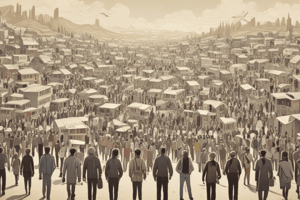Podcast
Questions and Answers
Which of the following is NOT a key aspect of demography studied by demographers?
Which of the following is NOT a key aspect of demography studied by demographers?
- Patterns of births, deaths, and migration
- The structure and composition of the population
- The economic and political aspects of populations (correct)
- Changes in population size
According to the passage, which of the following contributed to the emergence and establishment of sociology as an academic discipline?
According to the passage, which of the following contributed to the emergence and establishment of sociology as an academic discipline?
- The formation of nation-states as the principal form of political organization
- The development of Malthusian theory
- The beginnings of the modern science of statistics
- Both (a) and (b) (correct)
Which of the following is the MOST accurate definition of demography, according to the passage?
Which of the following is the MOST accurate definition of demography, according to the passage?
- The systematic study of population and its social, economic, and political aspects
- The quantitative analysis of population trends and processes
- The description of people and their demographic characteristics (correct)
- The collection and analysis of data on the people residing within a specified territory
The passage suggests that the formation of nation-states and the beginnings of modern statistics occurred at roughly the same time in Europe during the:
The passage suggests that the formation of nation-states and the beginnings of modern statistics occurred at roughly the same time in Europe during the:
Which of the following is a key focus of formal demography, as mentioned in the passage?
Which of the following is a key focus of formal demography, as mentioned in the passage?
According to the passage, which of the following is a key aspect of demography that is studied by demographers?
According to the passage, which of the following is a key aspect of demography that is studied by demographers?
According to Malthus's theory, what is the relationship between population growth and agricultural production?
According to Malthus's theory, what is the relationship between population growth and agricultural production?
What did Malthus believe would be the consequence of population growth outpacing agricultural production?
What did Malthus believe would be the consequence of population growth outpacing agricultural production?
What type of progression did Malthus believe population growth follows?
What type of progression did Malthus believe population growth follows?
What type of progression did Malthus believe agricultural production follows?
What type of progression did Malthus believe agricultural production follows?
What is the primary focus of demography as a field of study?
What is the primary focus of demography as a field of study?
What is the primary focus of social demography or population studies?
What is the primary focus of social demography or population studies?
What was Emile Durkheim's study on the variation in suicide rates across different countries used as an example of?
What was Emile Durkheim's study on the variation in suicide rates across different countries used as an example of?
In sociology, aggregate statistics refer to numerical characteristics that describe what?
In sociology, aggregate statistics refer to numerical characteristics that describe what?
What does the death rate in country-level or state-level statistics represent according to the text?
What does the death rate in country-level or state-level statistics represent according to the text?
Which field is primarily concerned with the measurement and analysis of the components of population change?
Which field is primarily concerned with the measurement and analysis of the components of population change?
What does Emile Durkheim argue is responsible for explaining the rate of suicide across different countries?
What does Emile Durkheim argue is responsible for explaining the rate of suicide across different countries?
Which concept in sociology offers a strong argument for the existence of social phenomena?
Which concept in sociology offers a strong argument for the existence of social phenomena?
Study Notes
Demography
- Demography is the systematic study of population, composed of the Greek words "demos" (people) and "graphein" (describe), implying the description of people.
- Demography studies population trends and processes, including changes in population size, patterns of births, deaths, and migration, and the structure and composition of the population.
- There are different varieties of demography, including formal demography (quantitative field) and social demography (focuses on social, economic, or political aspects of populations).
Importance of Demography
- Demography is of special importance to sociology, and its emergence and establishment as an academic discipline owed a lot to demography.
- Demography's focus is on quantitative analysis, with a highly developed mathematical methodology suitable for forecasting population growth and changes in population composition.
Theories and Concepts in Demography
Malthusian Theory of Population Growth
- Thomas Robert Malthus's theory of population growth (1798) argues that human populations tend to grow at a faster rate than the means of human subsistence, condemning humanity to live in poverty forever.
- Population grows in geometric progression, while agricultural production grows in arithmetic progression.
Social Demography
- Social demographers believe that social processes and structures regulate demographic processes, seeking to trace the social reasons that account for population trends.
- Social demography enquires into the wider causes and consequences of population structures and change.
Statistics and Sociology
- Aggregate statistics provide a strong argument for the existence of social phenomena.
- Social statistics offer a concrete justification for the new discipline of sociology, with examples like Emile Durkheim's study on suicide rates across different countries.
Studying That Suits You
Use AI to generate personalized quizzes and flashcards to suit your learning preferences.
Description
Explore the basic concepts of demography and its study of population trends, processes, and structures in the Indian society. Learn about changes in population size, birth patterns, death rates, migration, and population composition.




